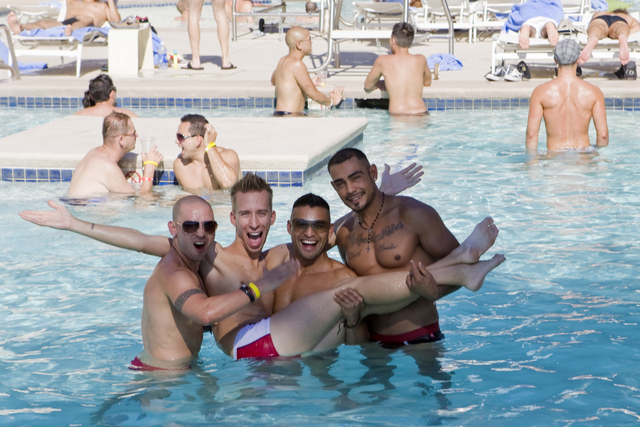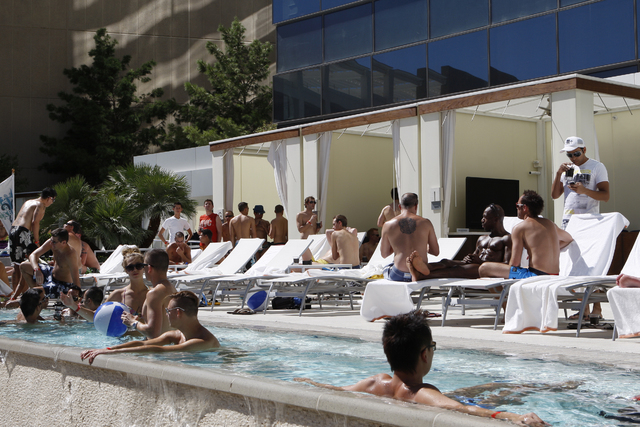Marketing to gays evolves into niche groups




These days, the hospitality industry may need to do more than simply market broadly to gay tourists.
It’s more complicated than that because of the niche groups within the lesbian, gay, bisexual and transgender communities.
Therefore, some hotels, attractions and tourism marketing groups are educating themselves about the subgroups to target-market specific niches or at least avoid offending some groups with inappropriate pitches.
More than 200 people looking to learn about niche marketing and issues within the gay community recently wrapped up a three-day LGBT tourism and hospitality conference at Bellagio.
Many hospitality companies are quick to seek out gay travelers because they generally spend more freely than their straight counterparts. But the companies acknowledge that it can be challenging to woo those customers because it takes sensitivity not to offend them or other guests in the process.
San Francisco-based Community Market Inc., which sponsored the conference, has years of research explaining why the market is so robust.
For gay men and women, the average household income is $81,500, about 80 percent higher than the average American household income, and about 40 percent of gay men have household incomes in excess of $100,000.
Gay men and women travel more widely than their mainstream counterparts, domestically and internationally, especially for leisure purposes.
In one conference session, “How to Successfully Sell Your Hotel To Leather Daddies, Blogging Lesbian Mothers, The Trans Community And Other Niches Within LGBT,” John Brosnan, LGBT liaison with San Francisco-based Kimpton Hotels and Restaurants, said the best way to avoid missteps is to have open discussions with gay employees about how to provide services and products that appeal to specific gay subcultures.
Brosnan said Kimpton has become one of the nation’s gay-friendliest hospitality companies by listening to their own employees about developing programs that appeal to certain types of guests.
Brosnan also suggested reaching out to local LGBT and gay pride organizations within communities or, in most locations, convention and visitors bureaus or destination marketing organizations.
The Las Vegas Gay Visitors Bureau, which opened in mid-2013 and is planning a three-day New Year’s Eve celebration for gay men, is effectively targeting a niche group called “bears.”
By definition, “bears” are large, hairy, masculine men in the gay culture.
Las Vegas Gay Visitors Bureau President Mya Reyes is marketing to bears for the first Evolve Vegas NYE celebration that is expected to bring 800 men for three days of shows, receptions, parties, dining experiences and shopping tours Dec. 30 through Jan. 1.
It’s being hosted at the MGM Grand, and the highlight of the event will be a New Year’s Eve celebration at the Havana nightclub at Tropicana Las Vegas.
“The most important thing,” Reyes said, “is to understand your customer. You’re not going to market to the Red Hat Society the same way that you would market to a group of truck drivers.”
Reyes, who formerly worked in diversity marketing with the MGM Grand and the Las Vegas Convention and Visitors Authority, spent years learning about gay markets before determining that she wanted to bring bears to town for her first New Year’s event.
“I think the most important thing is to overcome any discomfort you have talking about it,” she said. “You have to be comfortable having the conversation.”
With that, she explained that even within the bear community, there are subgroups. “Black bears,” for example, are men of African descent. Asian men are “Pandas.” “Brown bears” are Hispanic.
A “cub” is a young bear, and a straight female who befriends a bear is a “Goldilocks.”
One of the reasons Reyes decided to market to bears is that most have social personalities and often drink and eat a lot — great traits if you are trying to sell food and beverage packages.
“They’re a lot of fun,” Reyes said, “and they result in good revenue.”
Not every marketer feels it’s essential to focus on gay niche groups.
Jim McMichael, who has been the Las Vegas Convention and Visitors Authority’s diversity and cultural marketing manager for just over two years, said although the organization does provide advertisements specifically targeting gay markets, it doesn’t focus on niche groups, leaving that to individual properties and organizations.
“For us, we find that it is better to market broadly,” McMichael said. “It’s very difficult to market to each niche.”
The authority has found success in attracting or assisting in bringing large groups to Las Vegas and then concentrating on making the events larger and more popular since the city easily can accommodate added volume.
The Sin City Shootout, for example, will be in Las Vegas over the three-day Martin Luther King Jr. holiday weekend. More than 7,000 people come to Las Vegas for what essentially started as a softball tournament.
The competition, now in its eighth year, has evolved into a mini-Olympics with 16 sports.
“People will come to participate in the various games, but it has grown beyond that to a holiday weekend of networking and socializing where people will show up just to see their friends,” he said.
But McMichael concurs that some events work best for niche audiences. Dinah Vegas, a local lesbian event that grew out of the Dinah Shore Weekend in Palm Springs, Calif., isn’t an event that would work well for gay men.
McMichael said gay niche groups rose out of the growing acceptance of gay rights. Gay baby boomers, for example, took comfort in being closeted and would spend leisure time in resorts that specifically catered to gay audiences.
As the acceptance of gay rights progressed, millennials who came out when they were young didn’t feel threatened expressing their sexuality publicly.
“The difference is generational,” McMichael said. “Millennials who have been out since they were 12 or 13 now have the economic resources to travel. They don’t have to seek out gay resorts and just want to go somewhere that they’re accepted and can enjoy themselves with their friends.”
Contact reporter Richard N. Velotta at rvelotta@reviewjournal.com or 702-477-3893. Follow @RickVelotta on Twitter.












